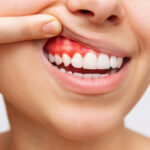Poor oral health linked to multiple cancer types, new study finds
 (NaturalHealth365) Liver cancer is one of the fastest-growing cancer threats in the United States and other parts of the world. Yet, too few understand that the health of the mouth could be the source of the problem.
(NaturalHealth365) Liver cancer is one of the fastest-growing cancer threats in the United States and other parts of the world. Yet, too few understand that the health of the mouth could be the source of the problem.
Past studies have established that poor oral health does increase the risk of several serious health conditions, such as heart disease, certain forms of cancer, stroke, and diabetes. Simply put, failing to take care of your teeth and gums will affect far more than just your mouth.
For example, a new study delved into the connection between periodontitis and cancer, particularly head and neck cancer, due to its proximity to the oral cavity. Another recent study found that bleeding gums, loose teeth, and other signs of poor oral health increase the risk of liver cancer. People who reported these symptoms had a 75% higher risk of developing this type of cancer.
Researchers surprised by the link between poor oral health and liver cancer risk
While cancers of the digestive system are a massive problem across the world, with gastrointestinal cancer accounting for nearly 28% of new cancers globally, the evidence linking poor oral health and these types of cancers has been inconsistent. So, researchers set out to examine data to determine whether there is a connection between oral problems like bleeding gums and these types of cancer.
Although the analysis, published in the United European Gastroenterology Journal, didn’t find a significant link between oral health and the overall risk of digestive system cancers, it did find something else.
When they started looking at cancers of specific organs, they found links between poor oral health and liver cancer, as well as cancers that occur in bile ducts and the gallbladder. The most definite link found was with the most common type of liver cancer – hepatocellular carcinoma.
Discover a Simple and Effective Way to Remove Toxins: This is Jonathan's #1 choice for at-home detoxification. Special offer ends Feb. 16.
Their analysis discovered that poor oral health increased the risk of this type of cancer by 75%. According to the American Cancer Society, since 1980, the incidence of liver cancer within the U.S. has more than tripled. In 2023, the American Cancer Society projects approximately 41,630 new cases of primary liver cancer and intrahepatic bile duct cancer in the United States, with 28,000 diagnoses expected in men and 13,630 in women.
Health warning: Vitamin C deficiency associated with mouth and gum problems
What can be done to improve the symptoms of poor oral health, like bleeding gums and tooth loss? Inflammation of the gums, tooth loss, and bleeding gums are all symptoms of scurvy – a condition brought on by vitamin C deficiency.
Although cases of (severe) scurvy are rare today, vitamin C deficiency still can cause oral health problems. However, it’s easy to address issues with the mouth and gums caused by a deficiency in vitamin C with supplements or simply increasing your intake of foods high in this vitamin.
Since your body can’t create its own vitamin C, you’ll need to get it from food sources or supplements. Fruits and vegetables high in vitamin C include bell peppers, citrus fruits, strawberries, tomatoes, broccoli, carrots, kiwi, and pineapple.
Of course, taking a daily supplement that offers between 500-1,000 mg of vitamin C per day can help, although higher amounts will probably be required for individuals who have chronic health problems and a higher need for vitamin C.
For better oral health care, be sure to brush twice daily, floss as needed, and use hydrofloss and essential oils to keep the mouth healthy and clean. Also, be sure to consult with a qualified holistic dentist for all your oral health issues.
Editor’s note: Find out how to reverse the threat of gum disease, root canal treated teeth plus much more, own the Holistic Oral Health Summit created by NaturalHealth365 Programs.
Sources for this article include:



